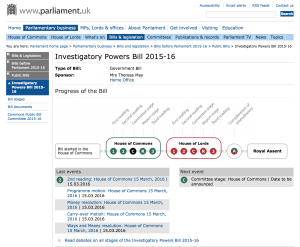
Yesterday, I voted for the principle of the controversial Investigatory Powers Bill. I very nearly did not: I detest state surveillance as a matter of principle.
Unfortunately, the Internet is not only a force for good. It has also liberated and enabled a number of appalling evils which even an ultra-minimal government would have to counter in the public interest. I cannot object in principle to the authorities having investigatory powers appropriate and proportionate to the criminal threat we face individually and collectively.
Big Brother Watch have provided a number of helpful factsheets and sent a lengthy briefing with important recommendations on data retention, targeted interception, bulk powers, equipment interference and safeguards. During the passage of the bill, and in particular at report stage, I anticipate voting to secure additional protections and safeguards.
David Davis’ important contribution, with which I agreed, may be found here. Towards the beginning, he said:
Today, everybody recognises the vital importance of targeted surveillance of dangerous criminals of all sorts.
I think everyone in this House wants to see our intelligence agencies and police forces equipped with effective measures that will help them to do their job. I do not think that there is any difference between us on that issue. However, the presentation of this Bill has required the Home Office publicly to avow a vast range of surveillance powers that to date have existed in secret. These powers seem to be rather greater than those used by our allies—certainly greater than those used by America or Germany. Some of them would have been struck down as unconstitutional in both those countries.
And towards the end:
This Bill, or something like it, is absolutely necessary. It replaces 66-plus other statutory mechanisms, so, in the interests of transparency, we need something to put in their place, but it grants sweeping powers with insufficient safeguards and not enough consideration of privacy. I ask all parts of the House to press for more time on Report to allow for reasonable amendments to the legislation that will put in place a world-standard law.
I look forward to working with David and other colleagues towards that end.
The full record of this well-attended debate may be found here.
The largest concern I have is how will you ensure that any such powers will only be used for appropriate purposes (and exclude council officials checking school addresses, bin details, general curiosity etc). A bill giving the powers only to police/ security services on the basis of a warrant but none of the other uses RIPA has been put to is important
I agree.